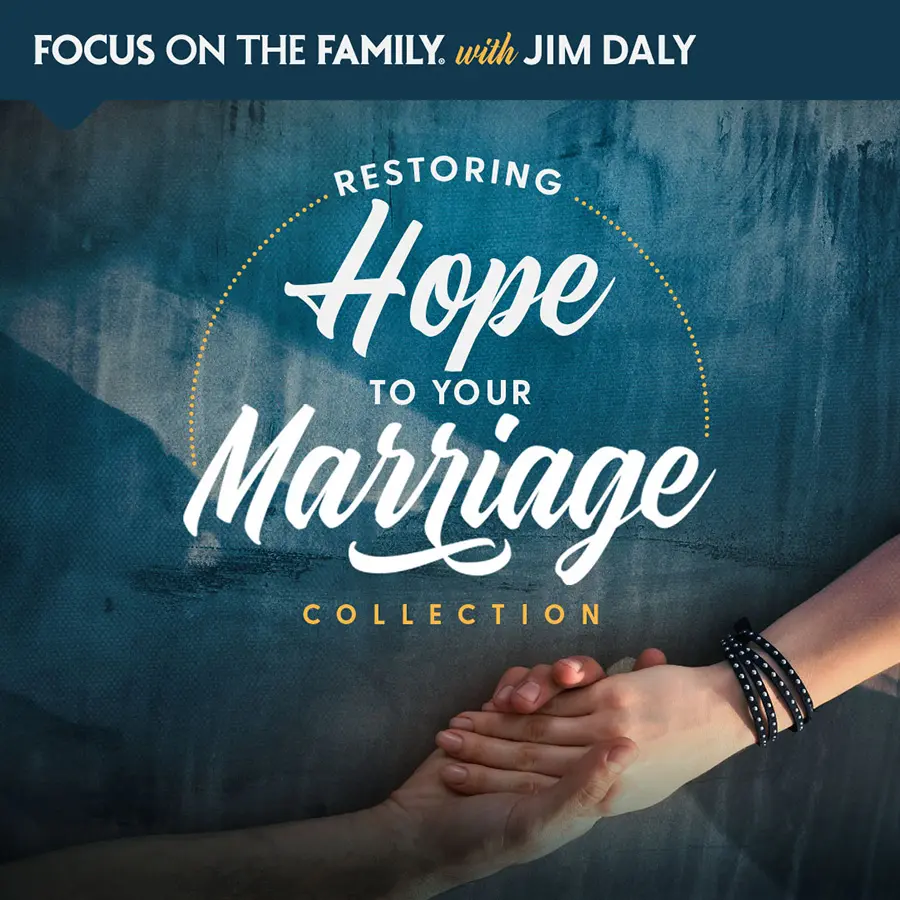Preview:
Paul Westbrook: As I look back, I also realized that I had actually lowered the bar when it came to the definition of a great marriage at some point in in my life. And, of course, when you lower the bar for a great marriage it’s easier to hit it.
End of Preview
John Fuller: Mm-hmm. Well, that’s a good point. And you’re gonna hear how this couple’s marriage hit rock bottom and how it was saved on today’s episode of Focus on the Family with Jim Daly.
Jim Daly: That’s the best part, how it was saved.
John: Mm-hmm.
Jim: Uh, today we’re gonna hear the nitty-gritty details of the near death of a marriage, uh, from the point of view of both the husband and the wife. Pastor Paul Westbrook and his wife, Melody, were very active in ministry for 20 years until their marriage hit the wall in the fall of 2014. And that’s the story we’re gonna share with you today.
John: Here are Paul and Melody Westbrook speaking at their home church, and you’re gonna hear Paul lead off, and Melody will join in a bit later on, on today’s episode of Focus on the Family with Jim Daly.
Paul: In November of last year we found ourselves at a point where our marriage hit rock bottom. I actually was a little self-deceived, I thought things were going pretty good. And about a month before that we’d had what I thought was a really good conversation, and I thought we were just humming along. But what I didn’t realize was that Melody was carrying some deep hurts and frustrations in her life that, uh, were largely a part of things that I had said and done. Just, um, uh, ignorant things that I’m embarrassed and ashamed of. That along with my drivenness and my focus and the long hours that I put in with church stuff and all that threw us, uh, into this, uh, this major crisis mode. It was, it was, like, this wake-up call for me. And I realized, “Man, I’ve got to do something to try to save my, my marriage.”
Melody Westbrook: Have you ever found yourself hurting so bad that you fall on your face before God? That’s what this time was for me. I had spent a lot of my life pretending that I was okay. If you know me you would be surprised because you probably thought everything was all right with me. Even my closest friends were shocked that, uh, that I was hurting so deeply. For me, this story goes much, much further back than four months, uh, ago. We’ve been in this church for 23 years ministering here, and for 23 years we’ve poured out our hearts to this church. We’ve, we’ve poured out our souls believing that this is what God had, uh, in mind for us. But I learned over time that as we sacrificed so much that we’re losing our marriage. And when I looked deeper I realized I was kinda sacrificing things for the sake of the cause.
And as I looked deeper I realized that that is not what God intended for this to be. God does not design or desire for us to give up our marriage or family for the sake of, of the cause. As my husband became more and more focused and driven in the growth of this church I became smaller and smaller. The more focused he became the less I felt. But what began to happen was, uh, he did his thing and he focused over here and his, his church and his ministry, and stayed focused over here. And then I did all my stuff over here, and I had my own ministries. And I look now that I did that in my life so I didn’t realize how much I was hurting and how much I missed him.
And as we did this we came like two ships passing in the night, kinda missing, uh, one another. So at the beginning of November, as Paul has said… Uh, well back up, one of my biggest complaints was that, that I couldn’t get his attention. I kept trying to get his attention and I couldn’t. So at the beginning of November, um, I shouted really loud and really long so he kinda had to, to listen to me. And actually, I look at that and, and he did have a choice. He didn’t have to listen to me, but, but he chose to do that. So as I realized… I, I thought I was starting a battle into one thing, uh, I realized I was in a battle, we were in a battle to save, to save our marriage.
But I wasn’t as hopeful as Paul was. I wasn’t as convinced ’cause I had taken all of these hurts and all of these frustrations and had stuffed them really deep inside. So I sought help with a Christian counselor and called up and, and made an appointment and, and went in by myself to see him. And I’ll never forget when I first sat down he looked at me and he said, “So, what’d you do to cause all this, to put all this in motion?” And then I told him. And he just smiled at me and he said, “It’s okay. It’s okay, because God can handle all of this.” And as time went on with him, every time I went into the counselor he’d look at me and say, “So is your anger done?” And I would just bow my head in embarrassment and shake it and say, “No, it’s like a bottomless pit.” And he said, “It’s okay. You’re gonna be okay. Paul’s gonna be okay. You guys are gonna make it through, and eventually your anger will stop spewing.”
Paul: Well, as, as we moved into this, uh, I, I started pretty much immediately going to Christian counselor, uh, same Christian counselor. And I remember, uh, very early on one of the most impacting questions that he asked me. And at the time it seemed kinda strange actually, but it was very impacting question. He said, “Paul, do you ever waste time with God?” And I was a little taken aback, and I go, “Well, I, I mean, yeah. I mean, I, I spend time with God.” And he said, “Oh, no, no, no. I know you’re a pastor and I know you spend time with God, but do you waste time with God?” And I said, “I, I, I don’t know. I don’t know what you mean. What, what do you mean by that?” And he said, “Well, that’s your homework for this week. Figure out what it means to waste time with God. And while you’re at it, start wasting time with your wife and with your family.”
Well, what I realized was that I was not good at wasting time. Just about everything that I do, uh, did in, in life was just so purposeful. Even my time off, I was very committed to taking a day off every week, but that was geared at, at recharging and to be able to hit the ground running and, and just be able to take the next hill, whatever it was that, that we were doing. It was, it was… Everything was purposeful in my life. But as I started doing that, as I started learning what it meant to waste time, and I, and I started wasting time with God and with, with Melody and, and with my family, things began to happen in- inside of me. And one of the things that I, that I realized is, anytime that you waste time with God you’re not really ever wasting time.
There’s a passage of scripture that God really used, uh, in my life at this point, it’s found in fo- Psalm 46:10. We’re gonna throw it up here on the screen. Says, “Be still and know that I am God. Just be still, be still, and know that I’m God.” That’s what I needed to do. And what began to hit home was that I could relax in Him. One of my big fears, and we’re gonna talk about that in, in just a second here a little bit more, is, is a fear of, of failure. Failure in what was gonna happen with the church and my life and, and stuff. And I began to realize through this that I can relax and trust God. Jesus is the one that said, “I will build my church.” It wasn’t up to me. I realized I didn’t have to put in crazy hours, that God was the one doing that.
And I began to learn to relax in Christ. And as I started wasting time with Melody, uh, even when we really weren’t talking very much yet, I realized that it was strengthening me, it was softening, uh, my heart. And I felt like it was helping me understand myself better. It was helping me see Melody in a new way. And I didn’t know whether God was really doing anything in her life or not during this time of wasting time. But I knew that He was doing something in me. He was deepening my love and my commitment for her and my commitment to our marriage.
Melody: At first, I, I didn’t know what Paul was doing when he was wasting time. Uh, we weren’t talking and we definitely… I didn’t really wanna spend a lotta time with him. Um, but every time I would look around he was, he was there. It was like I couldn’t get rid of him. And-
Audience: (laughs)
Melody: … I would sit down and, and watch a movie and he’d kinda walk in and, you know, “Can I sit here with you?”
Audience: (laughs)
Melody: “Yes, I guess so.” But over time, I wouldn’t admit it to him at that time, uh, I was beginning to enjoy it. And as time went on, uh, I did start admitting it to him. And I realized, uh, what I had longed for to have his undivided attention, I had it as he wasted time with me. And I’ve learned, and we’ve talked a lot even recently, that, you know, it’s not gonna stop here. We’re gonna learn to waste time, a lotta time with each other. And we look forward to that.
About a month into this ordeal (laughs) I remember Paul coming into the room and asked, uh, if I would be willing to go to what they call a Marriage Intensive. And I said yes, because I knew that that was the only hope that we had, uh, through Christ to do something like this. So we signed up for a three day, 20 hours of counseling, of intense marriage counseling. And before we left for this, uh, we had to fill out some, some sheets. And one of the questions that they asked was, uh, “Are you willing for God to do a miracle in your marriage?” And I marked yes on there because I did. I believed that God could. But to be honest, um, I couldn’t pray that God would heal our marriage, I could only pray that God would heal me.
John: This is Focus on the Family with Jim Daly. And you’re listening to Paul and Melody Westbrook. And, uh, you’ll hear, uh, from other couples like the Westbrooks who have gone through great difficulty in their marriage, but they found God can intervene and has restored them. Uh, we’ve put together a free audio collection, it’s five hours of help and hope. And, uh, you’ll hear from couples who have been redeemed from the brink of divorce. And then great principles and insights to keep your marriage strong from Dr. Greg Smalley and Dr. Bob Paul from our Hope Restored Marriage Intensives. The collection is called Restoring Hope to Your Marriage. It’s free, it’s five hours of content, and you can find it at focusonthefamily.com/broadcast or call for details 800, the letter A and the word FAMILY. Alright, let’s return now to the program as Melody Westbrook continues.
Melody: So the next day we started out on our 20 hours of, of counseling. Uh, and they’re not kidding when they say it was intensive ’cause it was really, really intensive. The, the first day after lunch our counselor had asked us to fill out a whole bunch of sheets. Uh, but one of it, the questions, several questions had asked was to go through, uh, this huge long list of fears and to start just marking off all the fears that you… that resonated with you, that you identified with. And it had kinda some descriptions of the fears. So the counselor, uh, took us through each of our fears and tried to help us to see how those had really affected our marriage. Um, and, and I see how they, they affected me. So as we finished that 20 hours of counseling, uh, it was really good, it was really positive. And, and we, we walked away with a definite newfound hope that God was gonna save our marriage. Uh, we were very excited.
Paul: But also during this time we were, we were given some insights that I’m not sure that we would’ve ever picked up, uh, without all this happening. And one of the, the things that they began to help us with was what Melody was, was just talking about, what they referred to as r- as relational fear cycle.
When we have these, these fears and one of our fear… the fear button gets pushed, in this case say that it starts with, with a husband’s fear button gets pushed, then what naturally typically happens is we react to that. A lotta times in the not the best way, not necessarily a real healthy way we react. And then in turn, what was so interesting about this was discovering that so many times when we react our reaction to our fear then triggers, pushes our spouse’s button.
And then once our spouse’s button, fear button gets pushed, anyone of their core fears, they tend to react. And a lotta times their natural reaction then in turn triggers our fear button again. And we just keep cycling. That was the story of our marriage. We’ve been doing that for 27 years, just going round and round. One of my big fears, as I said earlier, was the fear of failure. Uh, fear of failure, my, my marriage. Fear of failure, the church wouldn’t go and, and stuff. And so when that fear button in me would, would get pushed I would typically react. And there’re lots of ways you can react. Sometimes I go into fix-it mode. Sometimes I just get frustrated with Melody. Why didn’t she understand if I don’t do more then things might fall apart, or whatever, and I’d just get frustrated with her. Well, when I would get frustrated with her, I’d go into to fix-it mode, her feelings, which were her core fears, were, were feeling insignificant and unimportant.
Well, I’m frustrated with her and I’m putting in more time. And that just made her feel even more, uh, insignificant. And, and it would tap and, and push those buttons of fear in her. And so what would, would she do? One of her typical reactions was to withdraw. So then she would withdraw, and then I would start feeling, it would push my fear button of failure again, but related to the marriage. Like, “Oh, she’s withdrawing. She doesn’t love me. She doesn’t really care about me, doesn’t wanna be with me.” And so then I would react and we would just cycle and we would just keep going round and round and round.
And we looked at this and go, “Oh, this, this is, this is a mess.” And we, we were, we were, we were doing that all the time. And, and we realized part of what was so powerful, and, and this was one, understanding that, that we both contribute to, to this, both, both individuals do. But what was also powerful about it was realizing that all it takes is one individual to stop this, it doesn’t even take both individuals. One individual can take responsibility for their fears and decide that they’re gonna pause or create space in order to keep from reacting in ways that just keep this fear cycle going round and round and round.
And the way that you, that you create this pause and, and care for yourself is beginning to tend to your heart, care for your heart. There’s past scripture that, that talks about this. Proverbs 4:23, look at this up here. It says, “Above all else…” And anytime you, you run across a scripture that makes that kinda statement, “above all else,” you wanna pay special attention. “Above all else, guard your heart for it is the wellspring of life.” We’ve gotta guard our heart.
You see, we, we can’t change our spouse. I mean, that’s what we all tend to want, isn’t it? When there’s some kinda problem or issue. “Oh, if she would just change. If Melody would just quit doing this, if she would start doing that, she would just change and everything would be great.” It’s all her fault, right? To be honest, that never works. We, we can’t change the other person. The only person I can change, with God’s help, is me. And so I need to pause. I need care for my heart. And when I begin to care for my heart, that sets us up to be able to break this fear cycle, when both individuals commit to caring for themselves. Man, just amazing things can happen in, in a marriage.
Melody: Without going into the deep details, uh, I was raised in a very severely dysfunctional home. And so in my home, uh, it was kinda like my heart was just up for grabs, um, for whoever wanted to trample on it. When you’re raised in a home like that the concept of taking care of yourself, uh, it just doesn’t exist. So I got in this pattern of caring for everybody else in my life except for me. Uh, but one of the things that we realized, and I’m learning, is that I can take care of my heart first before I even take care of Paul’s. Paul talked just briefly about the, the fear cycle. Well, the care cycle is actually the antidote to the fear cycle. Um, so our counselors have given us permission basically, uh, when things are triggered to take a pause, kind of a time-out.
And for me at times it’s actually walking out of the room, uh, to take care of my heart first, to figure out what is going on in my heart before I can go back and, and communicate with Paul about whatever issue that it is. If you look in your, your outline, uh, we’ve got it listed on here and, uh, they gave us five As, uh, and it’s kinda funny when I p- pick up my book that the manual that they gave, and mine’s kinda worn out ’cause I keep going back to it, uh, trying to f- to figure all this out.
So if you take a look at it, the first A is aware, being aware of the signals that alert myself to my feelings. Do I feel flushed? Is my heart beating faster? The second one is accept. Welcome my feelings rather than trying to immediately rid myself of these feelings, am I willing to care for my feelings? The next one is allow, take a moment to invite and allow God to provide guidance in ways to care for myself. The next one is attend, identify the feeling and explore what is needed to move towards well-being. What am I feeling? Where is it coming from? Am I contributing to the feeling? What is the truth? What do I want? Who do I want to be? And then the last one is act, what could I do to care for me while maintaining my honor and integrity?
Paul: So this right here, this, this is the antidote to the fear cycle is, is caring for our heart. Because when we begin to take responsibility for ourselves and, uh, we begin to deal with these fears, instead of responding in an unhealthy way, we begin to respond in more appropriate, uh, ways. Now, e- even as we bring this up, as Molly’s talked about this, some of you may think, “Well, but, you know, caring for yourself, man, that just sounds selfish. Uh, I, I don’t know.” But you need to understand this is biblical, Jesus Himself taught this. Look, look at this, uh, in Matthew 22:39, this is what Jesus said. He said, “Love your neighbor,” and your neighbor is people around you, including your spouse. You love your spouse. But then look at this, as who? “As yourself, as yourself.” You see, God assumes, God expects us to love and care for ourselves.
If we aren’t caring for ourselves we will invariably end up interacting with the people that we are in relationship with in unhealthy ways. It, it’s interesting, as I, as I look back I also realize that I had actually lowered the bar when it came to the definition of a great marriage at some point in, in my life. And of course, when you lower the bar for a great marriage it’s easier to hit it. And through this I realized I don’t need to lower the bar. With God’s help as He… We keep Him at the center of our lives and our marriage. And as we’re willing to deal with our stuff, with our baggage, with our fears, we can have a better marriage than we’ve ever had. Not just a fine, not just an okay marriage, but a marriage, better marriage than we’ve ever had.
And I would just challenge you, don’t be satisfied with just a mediocre marriage, with just a fine or an okay marriage. One statistics that I came across during this time was that only about 12% of married people even begin to come close to enjoying the kinda marriage they dreamed of. That’s so sad, 88% of people walking around with way less of a marriage than they hope to have. And what I hope and what we hope and we’re praying that, that you’ll get hold of, is that there is hope. If you anchor your life in Jesus and you’re willing to do the work, it’s not necessarily gonna be easiest, you’re not necessarily gonna turn things around overnight, but you can have a better marriage than you’ve ever had. Things are so different for us, we’re not perfect, we haven’t arrived. But we’re at a whole different place and we are so excited of what God’s doing.
John: Mm-hmm. Wow. Such passion. You can hear the gratitude for what God did. Uh, those words of encouragement bring to a close this message from Paul and Melody Westbrook on Focus on the Family with Jim Daly.
Jim: Boy John, this is such a great testimony of how a marriage can be saved with some hard work and a willingness to look at your own faults, not just the faults of your spouse. Look at your fears and how you act when they’re triggered. Seek God’s help in the process and make your relationship with your spouse a high priority. And let me just point out, if you’re in an abusive situation, take the steps necessary to get to a place of safety before you seek help. But for anybody who’s experiencing difficulty in their marriage, uh, our counseling staff are here to talk with you and guide you through options and provide additional resources to help you.
John: Yeah. We have a team of caring Christian counselors and it’d be a privilege for them to give you a call at a time that’s convenient and hear you out, uh, find out where you’re at. They’ll offer some guidance. They’ll perhaps point you to some resources. They can connect you with somebody in your community. And they’ll pray with you. Help is a phone call away, our number is 800, the letter A and the word FAMILY, 800-232-6459.
Jim: I also wanna thank the Westbrooks for their honesty in sharing their story and for giving you a taste of what’s going on here at Focus on the Family’s Hope Restored Intensives from coast to coast, which by the way have an 80% success rate. It’s a great program and I’m so glad Hope Restored gave Paul and Melody the tools they needed to save their marriage. And, uh, you know, our research shows that we’re helping to save about 300 marriages in crisis every day.
John: Wow.
Jim: And, uh, husbands and wives are coming to us for help. And we need your financial partnership to be able to meet these needs. Uh, here’s just one example. We received this note from Gina in Texas. “After nine years of marriage I divorced my husband. He became a Christian soon after we separated and a few months later so did I. We remarried, but the first two years of our reconciliation were tough. I started listening to Focus on the Family on my way to work every day.”
John: Mm-hmm.
Jim: “The encouragement and biblical marriage advice was just what I needed to hear during that time. And the Lord used your program to teach me how to be a better wife. Thank you for your ministry.” And when she says, “your program,” everybody that’s supporting the ministry, it’s our program together. Uh, if you’d like to be part of that team to help Focus on the Family do this work and help marriages like Gina’s, please partner with us financially. And remember, when we save a marriage, we also save a family. We are helping to provide a stable home for raising children and sparing them from the pain of divorce and the poverty that typically comes with it.
And regardless of whether you can give to the ministry, we have a gift for you. We’ve put together a collection of free audio downloads, featuring marriages that have come back from the brink of divorce, plus insights from Dr. Bob Paul and his wife, Jenni, about how our deep-seated fears impact our relationship. It’s a full five hours of biblical wisdom and encouragement just for you. So look for the collection called Restoring Hope to Your Marriage when you visit us online.
John: Yeah. These free audio collections are really popular with our listeners. Uh, get yours today. You’ll find that Restoring Hope to Your Marriage Collection at focusonthefamily.com/broadcast. You can also call us, of course, if you have any questions or need immediate help. Our number is 800, the letter A and the word FAMILY, that’s 800-232-6459.
Let me mention that we have another free resource you might find helpful. It’s our marriage assessment. Over a million people have taken this, uh, assessment and found it to be super helpful. Uh, it’s about 10 or 15 minutes of your time and it’s gonna show you and your spouse, uh, how you can stay strong and where you can grow together as a couple, uh, maybe finances or communication. Uh, this terrific resource is free and you’ll find that marriage assessment on our website. Again, that’s focusonthefamily.com/broadcast. On behalf of the entire team, thanks for listening to Focus on the Family with Jim Daly. I’m John Fuller, inviting you back as we once again help you and your family thrive in Christ.






















